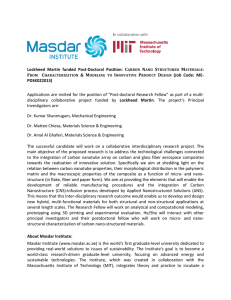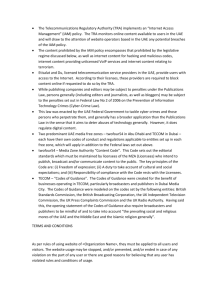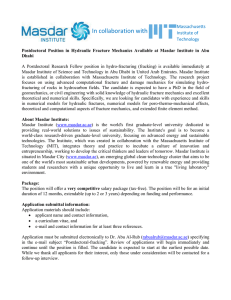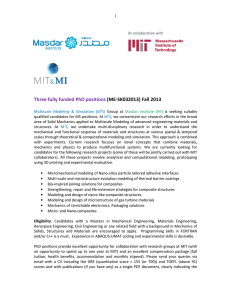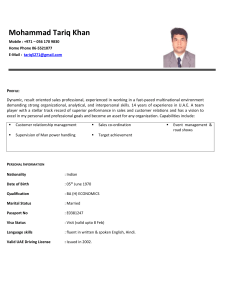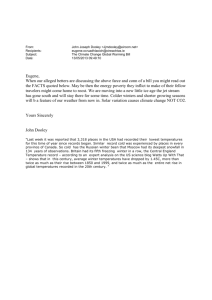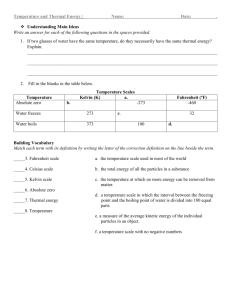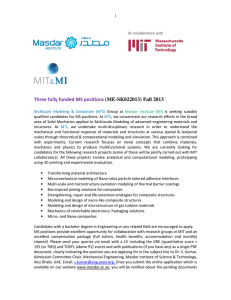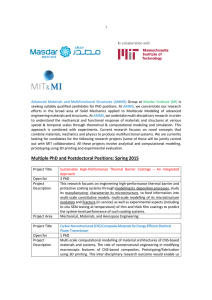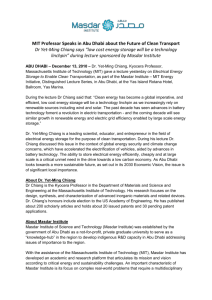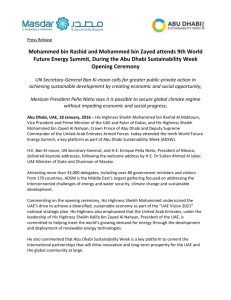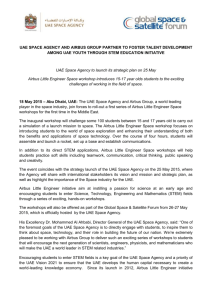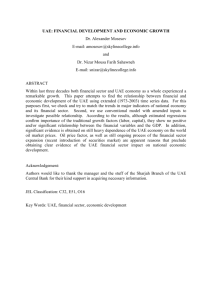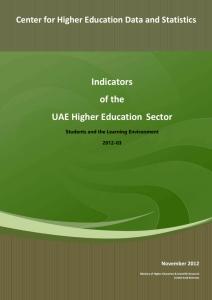Researching the cost of climate change on human health Global
advertisement
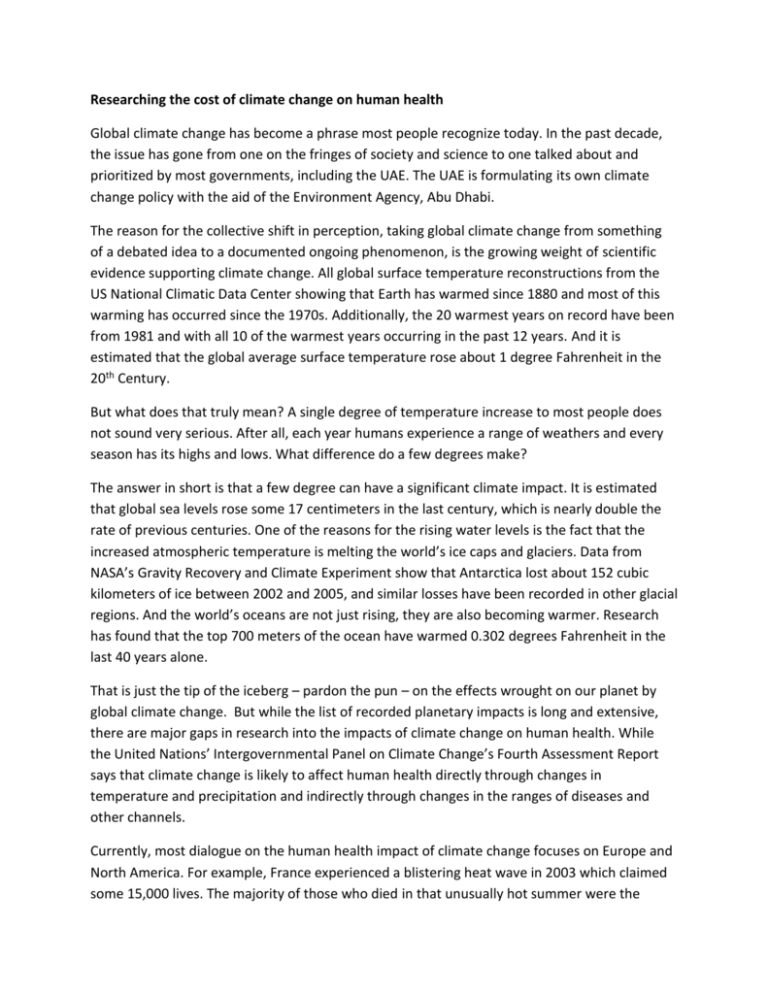
Researching the cost of climate change on human health Global climate change has become a phrase most people recognize today. In the past decade, the issue has gone from one on the fringes of society and science to one talked about and prioritized by most governments, including the UAE. The UAE is formulating its own climate change policy with the aid of the Environment Agency, Abu Dhabi. The reason for the collective shift in perception, taking global climate change from something of a debated idea to a documented ongoing phenomenon, is the growing weight of scientific evidence supporting climate change. All global surface temperature reconstructions from the US National Climatic Data Center showing that Earth has warmed since 1880 and most of this warming has occurred since the 1970s. Additionally, the 20 warmest years on record have been from 1981 and with all 10 of the warmest years occurring in the past 12 years. And it is estimated that the global average surface temperature rose about 1 degree Fahrenheit in the 20th Century. But what does that truly mean? A single degree of temperature increase to most people does not sound very serious. After all, each year humans experience a range of weathers and every season has its highs and lows. What difference do a few degrees make? The answer in short is that a few degree can have a significant climate impact. It is estimated that global sea levels rose some 17 centimeters in the last century, which is nearly double the rate of previous centuries. One of the reasons for the rising water levels is the fact that the increased atmospheric temperature is melting the world’s ice caps and glaciers. Data from NASA’s Gravity Recovery and Climate Experiment show that Antarctica lost about 152 cubic kilometers of ice between 2002 and 2005, and similar losses have been recorded in other glacial regions. And the world’s oceans are not just rising, they are also becoming warmer. Research has found that the top 700 meters of the ocean have warmed 0.302 degrees Fahrenheit in the last 40 years alone. That is just the tip of the iceberg – pardon the pun – on the effects wrought on our planet by global climate change. But while the list of recorded planetary impacts is long and extensive, there are major gaps in research into the impacts of climate change on human health. While the United Nations’ Intergovernmental Panel on Climate Change’s Fourth Assessment Report says that climate change is likely to affect human health directly through changes in temperature and precipitation and indirectly through changes in the ranges of diseases and other channels. Currently, most dialogue on the human health impact of climate change focuses on Europe and North America. For example, France experienced a blistering heat wave in 2003 which claimed some 15,000 lives. The majority of those who died in that unusually hot summer were the elderly, who, without the aid of air conditioning, were unable to cope with the suffocating temperatures that reached up to 104 Fahrenheit. This summer, Moscow was the site for a similar unfortunate weather wave with nearly 11,000 deaths due to a combination of high temperatures and stifling smog. And it is not just increased temperatures that are a human health concern. In 1999 the Midwest region of the United States was hit by a blizzard that caused 73 deaths while only a few years earlier, in the winter of 1993, some 300 US residents lost their lives in what was called a White Hurricane. In the 2008-2009 winter period, the United Kingdom recorded an extra 36,700 more deaths in England and Wales alone, compared to the average in the non-winter period and the previous winter saw another spike in deaths across Europe brought on by freezing weather. But that does not mean that climate change does not pose significant danger to other regions. In fact, we believe that the world’s hotter countries, particularly those that are heavily populated, less developed and have less wealth, could suffer far more extensively from climate change than what has been recorded in Northwestern countries. That is why a team of scientists at Masdar Institute of Science and Technology, to which I belong, is currently working to model and predict the cost of climate change on health in the region we call home including the greater Middle East, North Africa and South Asia. Climate change is expected to have an even stronger effect on human mortality in those areas compared to many others. This is because the hot climate is already making the temperature in these regions close to the upper threshold of the temperature that the human body can endure. And additionally, most countries in these regions are lower income, meaning that there are fewer resources, such as air conditioned homes and vehicles, to counter or mitigate the health impact of climate change. Governments and individuals have less to spend on coping with the weather and handling disasters. These factors jointly show that there is a great need to investigate how severely climate change may affect human health, particularly human mortality, in the Middle East, North Africa and South Asia. Through our research, we aim to show the link between increased deaths and increased temperature. It is our hope that this research at Masdar Institute will give forward-thinking governments like that of the UAE, which has made tackling climate change a major goal, the necessary information upon which to base their energy and climate policies and strategies to enhance the welfare of UAE residents as well as those around the globe. Research like ours is critical to taking climate change mitigation strategies off the drawing board into society. In order to help facilitate the action necessary to reduce the fatal impact of global climate change, we need to explicitly detail its cost to human life, giving governments, non-governmental organizations, lobbyists, media, and other scientists, the information they need to formulate plans of action. Climate change is not just causing environmental damage; it is causing loss of human life. With this research, highlighting the specifics costs of climate change to the health of residents of three of the most heavily populated regions in the world, the UAE and its Masdar Institute provide the understanding that allows policies to be implemented that can help save lives. -ENDSProfessor Dr. I-Tsung Tsai is an assistant professor in the Masdar Institute of Science and Technology’s Engineering Systems and Management Program. His research interests include carbon management, carbon finance, infrastructure policy, and information economics. He has a PhD in Risk Management from the Massachusetts Institute of Technology.



